Notice any unusual behavior in yourself or your loved ones? Find it hard to do what others do with ease? Do with ease what others find hard to do? Read on!

Discovering myself
I always thought that I was different from other people. All my life I have had the feeling that I don't understand much that others understand, and vice versa, others don't realize what's obvious to me.
On the one hand, for me some things were difficult that were easy for others. For example, openness and ease in communication, some subjects at school, and some elements of my work. On the other hand, I was feeling that my actions were somehow more logical and orderly compared to some of those around me, and the results of my work were more "in the spirit of perfectionism" (I especially often noticed this in my programming job, reading code written by other developers).
I always suspected that something was wrong with me, but I didn'tt know what exactly was the matter. Recently, however, "the puzzle has taken shape", and the situation had become clear. At the age of 48, I suddenly found out that I was not the only one who was "sent to this planet from deep space", but there are millions of us (people with genetically different nervous system and brain structure). I saw the numbers of the assessed people from 1% to 4% of the population, but judging by people I see around (although I may be wrong), the real number is clearly higher - many are not only undiagnosed, but do not even suspect that they have something that has a name (as I did until recently). People can live a whole life, not suspecting that they simply belong to another category of people, and they are not defective specimens of the only category existing in nature. They don't even know that different categories exist at all (did you know a minute ago?).
Contents:
• AQ test
• The situation has cleared up. I saw my life in a completely different way
• "But you don't look autistic!"
• Let's be classified?
• Let's be... not classified!
• And more about self-diagnosis
• Not a pathology, but an alternative way of being
• It is not easy... Introduction to ableism
AQ test
It was by pure luck that I passed an online AQ test (AQ stands for Autism Quotient, not to be confused with IQ - Intelligence Quotient!) - be sure to spend a few minutes and take it. Your score will be an indication of whether you're likely or unlikely to be on the autism spectrum. Perhaps you will learn a lot about yourself! What you think is autism is probably very far from the truth, if you have never dealt with this topic. The test "is published in a peer-reviewed scientific journal and has been statistically validated for sensitivity and selectivity" (the source - in Russian).
Autism is a neurotype (developmental distinction), considered a hidden disability. It affects how people experience the world and interact with others. Autistic people process information in an alternative way that causes them to see, hear, and feel the world differently than others.
You can't get autism, you can only be born autistic. It's for life: autism is not an illness and cannot be 'cured'. People feel being autistic is a fundamental aspect of their identity. Autism is genetic in nature and is caused by specific features in the structure and functioning of the brain, which affect world perception.
Autism (along with some other phenomena such as ADHD) is "neurodiversity", and autistic people are called "neurodiverse". The community of autistic people collectively constitutes a "neurominority". Correspondingly, other people are called "neurotypical", and their community is called the "neuromajority". Neurominorities resemble sexual minorities in the sense that both groups of people are not sick or wrong, but simply part of the natural, normal genetic diversity of humanity. However, in this case, we are not talking about sexual orientation or gender identity, but about the alternative way of consciousness functioning. As you will see soon, both of these groups use multicolor symbolism.
However, I am getting ahead of myself. Let's get back to the test and the revolutionary realization of who you are, which may explain many of the difficulties you have faced all your life.
The scale of the test is 0 to 50 and consists of a few segments. The following information is taken from the video Everything You Need To Know About The Online AQ Test:
• 0 to 10 - absolutely no autistic tendencies.
• 11 to 21 - the average for most of the population.
• 22 to 25 - a higher than average number of autistic traits.
• 26 to 31 - a borderline score. 86% of people with this score will be correctly classified as autists.
• 32 to 50 - very high likelihood of being autistic. 80% of the autistic adults and only 2% of the non-autistic control group scored 32 or higher. 43% of autistics scored above 38. However, none of the 174 not-autistic participants scored above 38.
So, a high score rather reliably indicates that you are on the spectrum, but a low score does not guarantee that there is no autism, i.e. this is NOT an autism absence test.
I got 37. Of course, the test is very approximate, although it will most likely coincide with the professional assessment if it will be made one day. [ADDED LATER: This is exactly what happened after 1 year and 3 months, when I was officially diagnosed with autism.] Please watch the video Self-Diagnosis Of Autism: Is it valid? It can be summarized in one word: valid!
A friend of mine, whose autism is outwardly more pronounced than mine and he has an official diagnosis, was scored lower than me. He explained it this way: "I got 34 but I think it's because that test seems more focused on social stuff than sensory stuff".
Of course, this test is only the first step in the self-discovering. If your score is above average, then the second step is finding information on the Internet and comparing it to yourself (the page you are reading now is a great starting point for this). Autists are known for collecting information about the subject of their interest a lot and with enthusiasm, "digging" the question in depth (that is named "special interest"). Often autism itself becomes such an interest, especially the first time after a person has discovered that he or she is most likely autistic and wants to get to the bottom of it. As you continue to study information about autism, sooner or later you can find that the AQ test was wrong in relation to you (this did not happen for me). It is possible that in the future you will decide to take the third step - official assessment.
The situation has cleared up. I saw my life in a completely different way
As far as I understand from the test and from many articles and videos, I am undoubtedly on the autism spectrum (level 1, previously referred to as high-functioning autism or Asperger's syndrome). How much better is certainty than the unknown! Many previously incomprehensible problems have found an explanation. Some peculiarities of perception and thinking, which have always seemed to me shameful flaws, for which I was responsible, turned out to be completely natural for a certain kind of people. Trying to change or overcome them is not only stupid, but also useless - they are beyond the control of my desires and willpower, it's just the way I'm built, it's my genetics
After having felt different for many years, experienced multiple challenges and, excruciatingly, not known why, I am still the same person. Yet... I became a different person. Nothing has changed, while at the same time everything has changed - discovering that I am autistic was a turning point. I reframed my self-identity and found a completely different version of myself. Suddenly it became clear that I was not a broken neurotypical person, but a normal neurodiverse person, so there is no reason to make claims or blame myself for anything. This new knowledge made me feel as if I was acquitted by the court, clearing me of a wrongful conviction after several decades. Why wasn't I told about this when I was a kid???
The experience of the guy from this video is very similar to mine:
"Asperger's put a name to something that I felt like I'd been struggling with my entire life. From as early as I can remember, I've had this feeling that I was different and that difference was bad, so you can imagine that finally putting a name to that and embracing that difference was incredibly liberating."
The girl from this Russian video is just reading my mind:
"I reacted to the diagnosis with great relief. When all your life you don't understand what the hell is going on with you, why you are different from others, and then they say to you: "That's why!" - it is such a relief, it changes everything so much, it gives you answers to so many questions! It really became a very big push towards a better life. I began to understand what to do, how to arrange my life, how to build interactions with people."

From here (in Russian):
"I am 37 years old, and now I have received the answer to the question that has puzzled me all my life - why I have such a hard time doing things that other people take for granted. This diagnosis put an end to a lingering personality crisis. For the first time, I realized what explains my special talent for being so smart and so stupid at the same time."
I completely share what the other person expressed in another Russian video:
"My first reaction was that I understand that some issues cannot be resolved, i.e. I can never become like everyone else. All my life I suffered from the fact that I could not become like everyone else, and because of this I tried to become better than others. This caused problems. And then I finally found out that I couldn't do it, because I am not like everyone else essentially. I quickly realized that since this cannot be achieved, then - ok, I don't have to worry about this anymore, I can proceed from what already exists. I am not like everyone else, so I will be what I am now. And I suddenly stopped worrying about it. So, in fact, it was such a good discovery, as I soon realized."
From a Russian forum:
"Why does knowing my diagnosis make it easier? Now I don't get so upset if something doesn't work out like everyone else. And I do not push myself to the point of being depressed. If a person really wants something, he will make increased efforts and look for non-standard ways and solutions. But in case of defeat, he will know that "I have done everything, but I cannot go against nature". If a person is short and was not taken to the basketball team, he will understand why. Before, I took offense at myself, felt a strong sense of guilt, but now I have found myself an excuse "I just am what I am." It became easier to perceive everything, many of my actions became more understandable. I had to spend quite a lot of time to: a) understand that if I cannot do something, it does not mean that I am worse than those who can; b) get rid of the feelings of guilt and inferiority firmly imposed on me because of this and learn to defend precisely my right to not be able to do something - so that they take this into account and do not demand this from me (in return, I can usually offer something that I can )."
A comment in the discussion of this page on FB (in Russian):
"My son is 10 years old. He read your story and cried. He said that he recognized himself and that it was good that he had read. Now he knows that he is not the only one like this, and it became easier for him. And there is no need to die or be afraid to live."
The thoughts and the feelings of the lady from this video are very close to mine too:
"...when I was 25 years old, I was diagnosed with autism, and it wasn't a tragedy. It was the best thing that's ever happened to me. Finding out that I'm autistic brought me an overwhelming sense of relief. My whole life, up to that point, finally made sense. My paradigm about myself shifted. I wasn't a failed neurotypical perso. I was a perfectly good autistic person."
From Telegram (Russian):
"...the diagnosis helped me validate many of my oddities and allow them to coexist with me. For example, I no longer suspect myself of stupidity and do not get upset when I remember that I like to process the relationship in writing, because verbally I have too little time to think how to say."
From the book Asperger Syndrome, the Universe and Everything (oh, I wish I'd known all that 40 years earlier!):
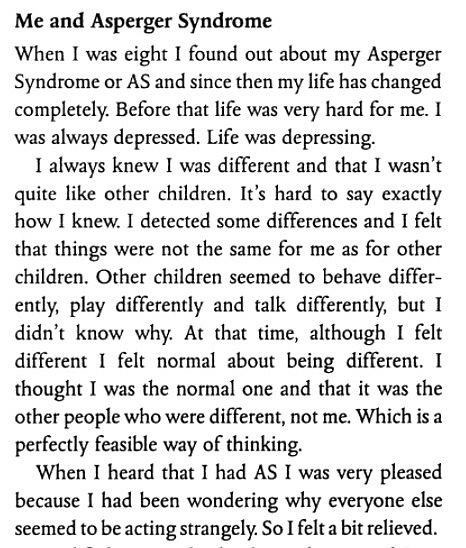
From the video Autistic People Aren't Broken NeuroTypicals:
"I was often setting myself to impossible neuro-typical standards, unfairly to myself for many years, when I didn't have the information that I was autistic. I didn't know I was a "square peg", trying to squeeze myself into a round hole, and I was damaging myself."
And here is what my virtual acquaintance Anna Deryuga, who does a lot to spread knowledge about autism in Ukraine, writes:
"Autistic people, regardless of ability or inability to speak, regardless of current developmental level, are neither "sick" nor "special."
They are normal, normal in the sense of their, autistic, norm, and being autistic is no more painful or shameful than being curly-haired, albino, or intersex. It may be many times more difficult, many times less comfortable, less "promising" in terms of education, career, or domestic independence than being someone else - but it's not shameful. Neither is the word "autism" shameful to anyone, and especially to yourself, because it's just the best "box" to date - a generalization of everything you were born with.
Many people with obvious problems that would be solved by knowing about autism are not ready to even start reading a popular article or take a test because "it's a disease", "it's a label", "I'll be in the same line with some retarded people, and I've spent my whole life trying to think of myself as NORMAL"....
It is necessary to change the narrative and the actual situation in society in the direction that recognizing yourself as autistic will not alienate you from society, will not devalue what you have achieved, will not "dehumanize" you to a "wild animal". You will just have a convenient name for your traits and experiences that did not fit into the previously known "boxes"."
I'll end this collection of quotes with a quote from... myself (FB):
"One day I came across a woman from Ukraine in a video chat. As it often happens, at first we were looking for a topic to talk about. I immediately realized that she was on the autistic spectrum (my internal "spectrometer" worked perfectly), but this had happened before - of course, I didn't say anything. She talked a lot about herself (it turned out she was 47 years old), and then asked if I was tired of her monologue. Тhen, without giving me a chance to answer, she "switched the TV program" and started a story about how she, when communicating in a company of friends, often rambles for a long time without a break before she notices that she has bored the listeners, but they say nothing out of politeness. This phenomenon, called info-dumping, sometimes occurs in autistic people, which is what I reported in the heat of the moment. The woman was offended - she thought that I wanted to insult her, because autists, as we know, are plants that do not react to others, make inarticulate sounds and bite. I immediately said that I myself am a diagnosed autist, so this could not be an insult. Seeing that her anger had subsided, I told her several typical autistic traits that I clearly see in her. For example, I explained why she practically doesn't look at the camera, but instead glances around, like an air defense radar or Elon Musk - many autistic people have difficulty making eye contact (which also applies to a video camera) because they are afraid of the evaluating gaze of others due to the fact that they have a rich life experience of negative evaluations of their words and actions. I also talked about her slow, slightly unnatural and intermittent speech. At the same time, I explained that thinking slowly does not mean thinking poorly, and that many autistic people want to construct their speech perfectly so that they are better understood (some kind of perfectionism - again, based on personal experience of not always being understood). But there are not enough resources for that. My interlocutor was just petrified! I even thought the chat was frozen. I told her about some other typical things in the lives of many autistics (including "concrete" thinking, the need for precise instructions, executive dysfunction and the problem with multitasking) - with a full debriefing and explanation of the reasons for some of the described phenomena. At one point I noticed that the woman was crying. She was listening to my long story and crying! Then I heard what I had read and heard many times before on YouTube. All her life she considered herself "defective" because she was so different from others. When I quoted to her the well-known phrase that "everyone around seems to be playing a game, but they forgot to tell me the rules," she completely burst into tears - I hit the sore spot. Then she calmed down and said that she didn't even suspect that there were other people like her. She always thought that she was the only one of her kind on the whole planet. It was her personal tragedy and a big intimate secret, and she never expected to hear from a stranger in chat-roulette a complete and accurate description of what was only in her innermost thoughts. So, in search of entertainment, I accidentally changed a person's life dramatically and completely."
BTW...
The Israeli army recruits autistic people to the military intelligence service. And it was the autists who discovered the law of gravity, created the theory of evolution and the theory of relativity, wrote the US Declaration of Independence and "Alice in Wonderland", composed "Turkish March" and "Bohemian Rhapsody", deciphered the 'Enigma' secret code used by German submarines during the WWII, established Microsoft, Apple, Facebook and Tesla. I am writing all this not to the fact that autism is cool (it's not cool at all, and it's not true that most autists are smart or gifted), but to the fact that if you find it in yourself or your child or spouse, do not rush to fall into horror, life is not ended - everything is not so bad, although it is undoubtedly fraught with problems. You knew about them before, but now you also know what phenomenon lies behind them and are armed with additional information.
"But you don't look autistic!"
"Autism spectrum" is a very general and vague name for a range of social communication phenomena ("autism traits") that can occur in different people in different combinations and to varying extents. Autistic people are all different - in the same way as neurotypicals ("NT") are not similar to each other. The stereotype that all autists are either very severely disabled and unable to communicate, or formidable computer geeks is nothing more than a meaningless stereotype.
Within the spectrum, there can be people with signs that are immediately apparent, as well as people you would never think of as autists.
There were many cases when autistic people "came out" and heard in response: "No, you do not have any autism, you do not look like an autist at all!" (as if there were some kind of clear portrait that all autistic people should fit into). Never say these words - they sound like "This is a figment of your imagination, don't slander yourself!" Can you imagine what it's like for people, who ARE autistic, to hear such a thing after so many years of struggling? You are forgiven for not knowing what you are talking about since you haven't spent a day being autistic, but they've spent their entire life.
Invisible disabilities always have more going on than what others can see on the surface. Someone saying "You don't look..." when it comes to a disability is just that person saying "I don't see your struggles, so I doubt your claim." Perhaps you do not see anything suspicious because the cruel life has taught your interlocutor to camouflage his/her peculiarities.
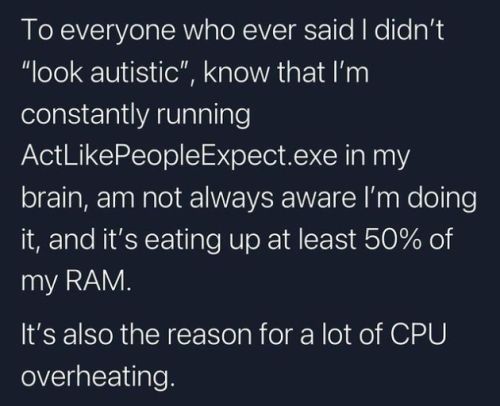
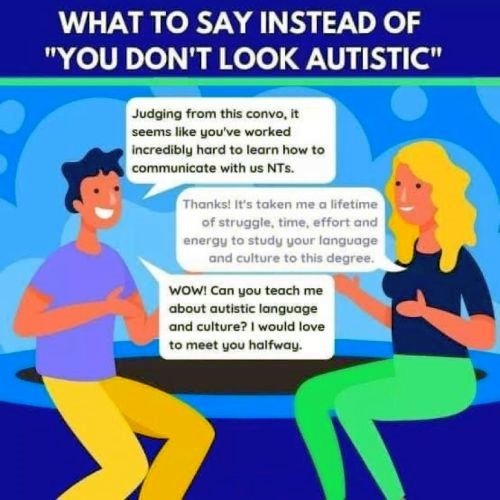
The "You can't be autistic, there's nothing wrong with you!" reaction is even worse because it assumes that autism is an abnormality.
From 5 Sensible Guidelines For Interacting With Disabled People (The Forbes):
"Don't try to minimize someone's disability.
One of the most common ways non-disabled people try to be kind to disabled people is to tell us in some way that our disabilities aren't noticeable or important.
Most disabled people want to be noticed and known for more than just their disabilities. But most of us don't want our disabilities ignored, overlooked, or minimized either.
Comments like, “I don't think of you as disabled,” “It's great how you don't let your disability hold you back,” and “You have overcome your disability so beautifully,” simply don't ring true for those of us who live with our disabilities every day. It doesn't matter how sincerely you mean the compliment –– these types of comments simply aren't what most of us need or want to hear."
Also, never say nonsense like "Oh, everyone is on the spectrum these days!", "Who doesn't have autism at least a little?", "It's fashionable now!" or "Autism is a convenient excuse for the lazy" - by this you will only demonstrate your incompetence. These phrases diminish the daily struggles that a lot of autistic people face. Yes, non-autists might have certain traits, typical for autism (for example, anxiety or difficulty interacting in a social situation), but everybody isn't a little bit autistic, just like everybody isn't a little bit pregnant (even though everybody might have some of the signs of pregnancy like nausea, craving for salty foods and sore back). You either are autistic or you're not. Another analogy: 10 kg overweight and morbid obesity with 200 kg on the scale. Both are overweight, but only one case is a disability. 10 extra kg don't mean "morbid obesity a little bit".
The presence of autism features at a level of severity above average (broader autism phenotype, or BAP) is not yet sufficient for a diagnosis to be made. Most often, there are minor impairments in social and communication skills. BAP occurs with an increased frequency in family members of autists, which is associated with the genetic nature of autism. Please watch the short video But we're all on the spectrum somewhere!.
Well, the "last straw" is the phrase "suffer from autism." Autism is not something people suffer from; it is not a disease. People simply are autistic. What they suffer from are demands that are fundamentally inapplicable to them. Just as people do not suffer from being homosexual but can suffer from homophobia.
Let's be classified?
Autism is traditionally (which does not mean "correctly" at all!) divided into low-functioning (LFA) and high-functioning (HFA). Functioning refers to the physical ability to function in society and life in general (including self care skills) with less or more need for support. It is not at all about the quality of brain functioning or the level of suffering (as some people mistakenly perceive this terminology).
• Low-functioning ("deep", "profound", "severe", "classic") autists "live in their own world", have enormous difficulties in communicating with the outside world and arranging life, and usually do not speak or speak with difficulty and very poorly (although, sometimes, they write books and make millions on Wall Street). The fact that such people look aloof and poorly responsive to external signals does not mean that they do not understand what is happening or intellectually less developed than you. They need substantial or very substantial support of other people.
• High-functioning ("mild") autists "live in a common world, but in a special way", they are better adapted to life in society. Although their life is fraught with difficulties, they need less support (this is what the official classification says, but it is not always true). From the article Asperger Syndrome: 50 important facts about having "mild" autism: "If you have it "mildly", you're at the awkward midpoint of being "normal enough" for everyone to expect the same from you as everyone else, but "autistic enough" to not always reach those expectations".
Asperger's syndrome has always been considered a type of autism at the highest-functioning end of the autism continuum.
"People with Asperger's Syndrome tend to develop speech in the same way as typically developing children, but they have significant social difficulties. These difficulties become more evident as they mature and social expectations rise. Because people with Asperger Syndrome are often quite intelligent but also “quirky,” the disorder is sometimes referred to as “Geek Syndrome” or “Little Professor Syndrome.”" (the source)
From the video Aspergers In Society - The Hidden Mental Health Crisis (Autism Documentary):
"Those with Asperger's Syndrome are generally indistinguishable from an average person. They often go without the social support that others on the autistic spectrum receive. They are given special education to help them fit better into society but they stand as some of the most vulnerable individuals at all stages of life. At school they are bullied, socially isolated. In adulthood 70% of autistics receive a significant lack of support from social services and at least one in three live with severe mental health difficulties."

According to the North American diagnostic criteria adopted in 2013, the diagnosis of Asperger's syndrome has been phased out. However, the term continues to be used in articles and blogs. Autism is now divided not into two, but into three levels (note that the terminology "High-functioning" & "Severe" is not official, but has remained in use since the time when it was used in diagnostics):
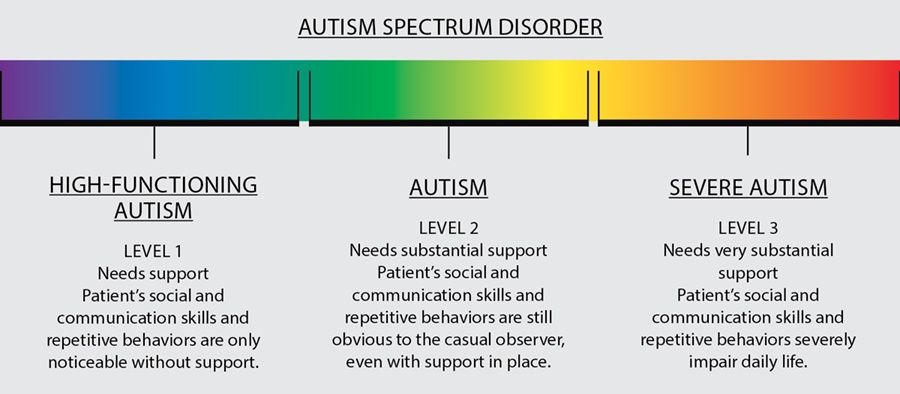
Please pay attention that high-functioning / level 1 autists still need support.
Let's be... not classified!
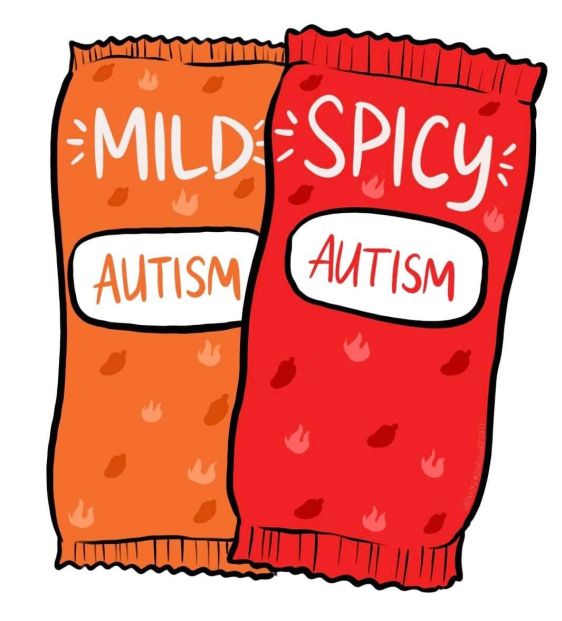
In the autistic community itself, the opinion is rather different. Many people deny the idea of classification at all. They say: every autistic person is equally, 100% autistic. People do struggle in different ways but that doesn't make them less or more autistic than another autistic person.
People with greater or lesser support needs do exist. But the main problem with the existing classification is that it does not consider the objectively existing need itself, but only how this need is visible from the outside. For example, if a person is working, but is constantly suffering and struggling in a way that is not visible to anyone, then officially they are fine, they are high-functioning.

The autistic identity is an entire universe. That identity is too complex, too unique, too infinite to be put on a single line.
There are at least five serious reasons to question the legitimacy of the existing classification.
• Dividing autism into low-functioning and high-functioning/Asperger is meaningless since the truth is much more complex. The spectrum is not one-dimensional (from "A little bit autistic" to "Very autistic"), but multidimensional (higher/lower scale separately for each of the many parameters which also can manifest themselves in different ways). Every autistic person has their own unique mix of traits, strengths, needs, sensory systems, interests, and personality. It can also be the case that if you compare two people, they have no coinciding traits at all. They may be the exact opposite of each other, but they are both autistic.

Many autistic people have what is called a "spiky profile", which means the same person can have both pronounced abilities and disabilities - whether or not they require full-time support. That is, a person can be high-functioning according to some criteria, and low-functioning according to other traits. One day on Instagram I came across descriptions of two completely different autists - one was typically "mild" and the other was typically "severe". At the end there was one phrase: "Both of these people are me." A person can seem "high-functioning" and really have trouble with basic everyday tasks just like a person who seems "low-functioning" can really excel at things that are used in everyday life. Moreover, the strength of various manifestations can change over time - even over the course of a single day.
• The existing diagnostic criteria are unreliable. They do not "look inward," but are based on external manifestations. Autism is first and foremost a way of thinking and seeing the world, while the signs are collateral, and not necessarily present in everyone. The specialist observes neurodiversity from the outside, has no way of knowing exactly what is happening in another person's head, and often misunderstands this. What the diagnostician sees often doesn't reflect what and how the person feels and thinks, and doesn't tell the whole story. Many people are so accustomed to masking their autistic traits that they automatically continue to do so even at a specialist appointment. Those autists may go undiagnosed only because they've had a lifetime of successful practice to appear "normal". From the video Autistic Communication - The VERBAL Spectrum: "The trouble with current diagnosis guidelines is that they're not based on the way a mind works but on opinions of how we express ourselves externally. If the diagnostician cannot understand the way we communicate, or they think we express ourselves too well, it will impact their assessment. This wouldn't be a problem if those assessments didn't shape peoples' futures, determining what opportunities and services will be available to us and the way others will interact with us, possibly for the rest of our lives."
• The diagnostic methods are subjective. There have been cases where one specialist has classified an autist as LFA and another as HFA.
• Autism has its problems and advantages. However, the diagnosis is completely focused on the negative half - it's even named "Autism Spectrum Disorder". From the video We Don't Have a Definition for Autistic Success Because We Only Talk About Autistic Struggles & Pain: "Autistic people are so defined, especially by the medical industry, by our struggles, pains, deficits, and the hard parts in life. Often the joys, positive experiences, and our skills are completely ignored. We don't even, really, have a good understanding of what autistic success looks like, because, by definition, autistic people are often described by our failures. In order to receive an autism diagnosis, I had to be able to show the ways in which I was struggling to live up to expectations in neurotypical society and in the neurotypical world. If you look at the medical criteria for autism, it is written around our weaknesses. It talks about our deficits. In order to meet the criteria for an autism diagnosis, you must be struggling, or in crisis, or have your deficits on display, easy for someone else to see. If you are masking, camouflaging, good at compensating for your weaknesses, or are just well supported in life, it's much less likely you'll get a diagnosis; because you can be autistic and still managed to thrive in the neurotypical dominated society that we live in. ... Our current definitions of autism, and autistic people, have been written by non-autistic people, who have observed us from the outside, with little to no insight on the inner workings of the autistic mind, or why we do the things we do. They have written down a list of things that they found annoying, or inconvenient, about those of us whose minds work differently, and completely ignored the fact that autistic people, just like non-autistic people, are whole, full, and complete people. We are more than just our struggles and our weaknesses. We are also our strengths, our joys. ... What the current medical definitions of autism has done is taken everything that is different about autistic people, and spun it into a weakness, or a problem. Even some of the things that, actually, if looked at from another angle, can be part of our biggest strengths."
• Functional labels of any kind are used against us. They disadvantage us, as they are assigned based on how our autism impacts on those around us as opposed to what being autistic means for us. The labels are mostly about categorising and packaging us up for easier processing by a broadly neurotypical society, but they don't help us at all. The labels don't mean anything, they just describe less or more recognizable autistic traits. And it may even lead one to believe that "more apparent" somehow means the same as "more severe" or "more suffering". Just because someone appears to be coping/masking doesn't identify the struggles and feelings they have on the inside. What may be hiding behind the traditional labels are just "high masking" and "low masking." "High functioning" is essentially code for "masks well enough to mostly pass as neurotypical". When autistic people are labeled "high functioning", their needs and the fact that they have a disability is erased. Some autistics need support they don't qualify for due to being officially declared "high functioning". And, oppositely, a "low functioning" person will often be automatically considered too retarded to treat with appropriate respect and autonomy, particularly if the person doesn't speak. Labels deprive the prospects of those recognized as "low functioning."
From the video High Functioning Autism (It's NOT what you think!!):
"High-functioning literally means invisible struggle. What it does not mean is reduced level of difficulty, reduced level of challenges. People talk about mild autism. And when you think about it in those terms, it sounds as though high-functioning means your challenges are less. Now that's sometimes true, but what it really means is whatever struggles I'm going through, you can't see them. It's like a duck paddling under water, putting in a huge amount of effort behind the scenes to appear to be doing really well. And we often do do really well. The key here is the amount of effort that it takes to do really, really well. And because of that increased amount of effort, we are often at our limit all the time."
From a FB post (in Russian):
"The idea of mild and severe forms of health limitations and disability is often not about how the person experiences condition, but about how those around experience it. If a person interferes with others, and makes their life difficult, then he or she is low-functioning: lost to society, a tragedy for the family. Such a person is unlikely to receive adequate accommodations that will allow him/her to unlock their potential and find a sense of comfort and happiness. Efforts will be directed to help those around such person, to compensate for THEIR discomfort. Sympathy is also directed to them. And if difficulties are visible only to the person who experiences them (like chronic pain), then he/she is high-functioning. Don't let him/her fool around and count on help. That person is doing just fine. And anyway, how is he/she not ashamed to ask for some kind of support with a mild disability, when there are people who are much worse off.
This is the cannibalistic model, in which the person with a physical condition is always the loser. Either you are "too disabled" - you are not beneficial to society and therefore society denies you, or you are "not disabled enough" and society is ready to accept the benefit you bring to the table, but is not ready to support you where you need."
So, saying "low functioning" leads to dismissing a person's abilities, whereas saying "high functioning" dismisses their disabilities. For that reason, try to avoid using any functioning labels. Just say "autist", "autistic", "autism" as well as "high need for support" and "low need for support". If you want to describe a particular person, list specifically their autistic strengths and areas where they have a disability and need support. This is a much more practical approach than using ambiguous labels.
And more about self-diagnosis
We have just made sure that official diagnostics are flawed, to say the least. This means that the role of self-diagnosis, which is sometimes skeptically discussed, is far more important than it might at first seem.
People often make fun of those who "diagnosed themselves via the Internet". This can indeed be very dangerous when it comes to illnesses, which autism is not (although there are many cases where doctors are either not up-to-date and following outdated guidelines created many decades ago, or are financially interested in keeping you sick and making money for the medical business and big pharma - many pages on this site are devoted to this). As someone who has both the self-diagnosis and the official diagnosis, I contend that if you have seriously researched the subject of autism, your conclusions are more reliable than those of someone who sees you for the first time in their life and has talked to you for a few hours simply by asking the very standard questions you will find on any online autism test. Can self-diagnosis be wrong? Yes, of course. But the probability of this is no greater than the probability of an erroneous conclusion of a specialist. It is probably less likely if you have devoted enough time to studying the information.
From the video You should know this about autism (in Russian):
"Self-diagnosis is OK. Again, going back to the fact that autism is not an illness. Accordingly, you don't need a doctor's confirmation to know that you are autistic. That's as silly as needing a doctor's confirmation to know you're gay or lesbian. Or you need a doctor's confirmation to know if you're an extrovert or an introvert. That's silly. It's just a characteristic of your personality, and it's up to you to decide whether it applies to you or not. And it's unshakable if you've studied the topic. The main thing is to study it deeply - you don't have to decide at first impression, of course, but if you're autistic, you will study it deeply. And if you don't want to study it deeply, if you're just like, "ahh, well, I could be autistic" - and go, it's probably not about you. If you decided so, that's OK. Even if you made a mistake in this (if you first decided you were autistic and then realized you were wrong), there's nothing terrible in this - it won't hurt anyone that you were wrong. It's OK to examine yourself, and don't be afraid of your mistakes, it happens to everyone. Just know that no one knows you better than you, and only you can decide what kind of person you are, what group of people you belong to, how you feel, and what kind of thinking you have. Only you can understand this. And if you conducted a self-diagnosis, carefully studied the topic and realized that this is about you, then it is so, and no one can reproach you for this, and no one can say otherwise. "
The page you are reading right now is a great starting point for a serious dive into this issue. This page contains so many quotes that I found online over the course of several months after taking an online autism test, and decided to concentrate in one place to make it easier for those who, like me, happen to find out about their autism.
From https://www.facebook.com/livedexperiencecounsellor/posts/306976381163733:
"self-diagnosis is NOT seeing something on the internet and diagnosing yourself because you can relate.
self-diagnosis IS knowing you're different and spending countless months and years researching, learning and doubting and exploring both internal and external experiences before even making a decision.
self-diagnosis is NOT reading a Wikipedia page once and deciding you're autistic after relating to a single trait.
self-diagnosis IS connecting with the community and other autistic people, reading and reading about the internal autistic experience rather than just the criteria and connecting the dots from all those years living as an autistic person.
so in that case...
if you are against an autistic person self-diagnosing themselves with autism then it means you believe autistic people need permission from neurotypical people to talk about their own damn lived experience and identity.
you know, the lived experience that they are living every single day? you know, the identity that is THEIR neurology and who they are?
if you only listen when a professional has confirmed it...
that's called ableism."
From https://www.facebook.com/livedexperiencecounsellor/posts/304688588059179:
"Let's quit with the shaming of individuals learning about ADHD or autism from TikTok or IG and self-identifying or self-diagnosing, okay? It doesn't mean it's a phase or a fad or trendy nor does it mean it's actually inaccurate or something everyone does either. Individuals who learn about autism and ADHD from social media are probably getting a more accurate and informed understanding than most professionals. Learning from other autistic individuals and ADHD-ers through social media should be respected. Neurodivergent individuals should be considered the experts and voices for our own experiences."
In any case, the role of self-diagnosis remains very important, if only because it is not easy to find a specialist who diagnoses "autism" in adults. For a long time, autism was thought to be a "childhood disease" (as you can see, both words in this phrase are wrong). Science categorically refused to answer the question "Where do disappear autistic children when they grow up?".
Not a pathology, but an alternative way of being
Those who are completely out of the loop often confuse the concepts of autism and mental illness (such as mental retardation/intellectual disability or schizophrenia), but they are not the same. Autistic people may or may not have mental illness in the same way as non-autistic people. I.e. they are simply different, unrelated dimensions - like weight and height. Nonetheless, the percentage of autistic people with mental retardation is higher than among neurotypical ones. There are many causes of mental retardation, and the impairment of developmental mechanisms in autism is one of them. To be more precise, among autists, there is a greater spread in both directions from the area of average intelligence values. That is, a larger percentage of not only the mentally ill, but also very talented people. Those who support the classification of autism would say that for HFA / Level 1, the rate of mental retardation is 0% by definition, because it's recorded in the diagnostic criteria. Watch this video: I'm NOT CRAZY! (I'm Autistic).
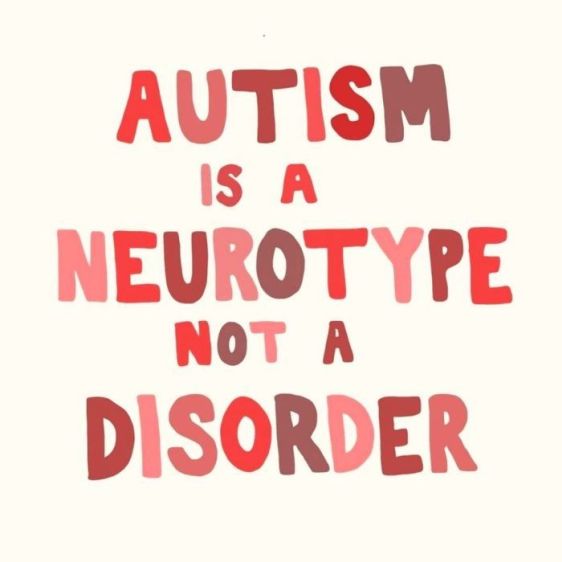
The name "Asperger's syndrome" was dropped because both the words in it are problematic. Firstly, the Austrian pediatrician Hans Asperger was a Nazi. Secondly, the term "syndrome" implies a disease that has a beginning, course and a definite ending, and must (or at least can) be cured. The definition of "syndrome" says it's "a group of symptoms". Now, let's find the definition of "symptom": "a physical or mental feature which is regarded as indicating a condition of disease". So, "syndrome" means that the person is sick. However, autistic people are not sick - they just have different perceptions, thinking, information processing, priorities and values. Different is just different - it doesn't have to mean bad or abnormal. Autism is not like a runny nose or a broken leg - it's an innate condition that accompanies people all their life and is their way of life, nature. You can't take an autist, give them a cure and make them non-autistic. In this case, we are talking about a less common expression of the human genome: an alternative (but not pathological) variation in the structure and function of the brain and nervous system, which simply exists in a certain percentage of people, i.e. is not the norm just numerically.
(You might be wondering - then why is "asperger" in the URL of this page? The answer is simple - when I created it, I was just starting to dive into this topic and didn't know the ins and outs of it yet. Later I wanted to change the address of the page, but I decided not to, because the links to it already existed.)
Recognition of differences is about moving away from labelling our differences as deficits and instead, recognising the diversity in how we function. According to the neurodiversity paradigm, there is no such thing as normal because normal is a social construct - there is no standard/right or non-standard/wrong mind or brain. If neurotypical people are not the benchmark for functioning, neurodivergent people do not have deficits. This, after all, on the same grounds can work in the opposite direction: if neurodivergent people are the benchmark for functioning, neurotypical people have deficits.
Common and very accurate analogies for autism that I've come across are redheads, left-handers, homosexuals and whites: quantitatively - not the "norm", but qualitatively - not worse than the majority. Rather than viewing the differences as handicaps, experts urge recognizing and respecting neurodiversity as just one of many human variations.
Terms such as "disease" and "disorder" suggest a deviation from the normal state of a particular body. If a disease is cured, the person is still themselves and their personality is unaffected. Autism, on the other hand, is part of the personality. It's a normal condition for the autist, their natural state, so any attempt to "cure", "correct" or "modify" autism in any way is devastating. It's absolutely as ridiculous as medical treatment of neurotypicality, or curing a dog in an attempt to turn it into a kangaroo. Deciding autism is a medical condition eases the minds of those who profit from it. Unfortunately, the multimillion-dollar autism treatment business is booming. Of course, not a single autistic person has yet been "cured" (the only effective method would be a brain and nervous system transplant), and treatment refers to forced "dog training" in order to make an autist more comfortable for the surrounding neurotypical world, which is primarily concerned about its own comfort, hypocritically presenting the "medical services" as a kind attitude and desire to help autistic people. Remember the infamous ABA therapy, which replaces inner motivation with outer motivation, teaches obedience, suppresses attempts to assert one's own interests, and violates the child's personal boundaries: the child must follow the therapist's instructions, ignoring their own needs and emotions. "Autism therapy" tries to "fix" behavior in extreme ways, but there is nothing wrong with the behavior of autistic people, it's just the judgment of neurotypical people who do not understand us and therefore want us to change to suit their requirements. A professional trainer can make a dog jump on its hind legs, but it will not turn into a kangaroo. The fact that the ABA industry has managed to convince the world that their abuse is the only way an autistic individual will ever have a future has to be one of the most insidious con jobs of all time.
The diagnosis I officially received was "Autism Spectrum Disorder, Level 1, Without Intellectual Impairment". This contains a contradiction: if "without intellectual impairment", then why "disorder"? BTW, the full name of the medical document that defines autism in North America is "The Diagnostic and Statistical Manual of Mental Disorders". So, just another way of thinking is officially considered a mental disorder. But why the "Neurotypical Spectrum Disorder" diagnosis is not made for non-autistic people? Obviously it's discrimination. But isn't discrimination a criminal offense in countries of laws such as the United States and Canada? In 1973, the American Psychiatric Association removed the diagnosis of "homosexuality" (just try to say today that homosexuality is a mental disorder!). I am truly happy for the sexual minorities community which was able to achieve the de-pathologizing of homosexuality, and I don't give up hope that the neuro-minorities community will be able to do the same and remove the autism "diagnosis" someday.

Nevertheless, the term "diagnosis" is in wide use even among autistic people - perhaps because it sounds more convincing and "irrevocable" than the vague "assessment". Of course, no one should forget that what is actually meant is not a diagnosis of pathology, but a determination that a person is autistic (made by themselves or by a specialist).
Autism and autistic people need to be de-pathologized. Blind, deaf and many other disabled people get the services and accommodations they need without being labeled as having mental disorders. We don't have to call autism a a disease to acknowledge that autistic people are disabled and can need help.
From Why requiring Autistic people to be diagnosed is a betrayal of the Neurodiversity movement:
"Being Autistic is an identity based on a specific neurology. It is not inherently good or bad. There is nothing to be fixed or cured, so why force people to acquire a diagnosis? Should we not have accepted by now, in the 21st century, that neurodiversity is a natural phenomenon, and not a collection ailments requiring intervention."
However, some changes for the better are beginning to appear. Read the article Autism Treatment Shifts Away from ‘Fixing’ the Condition.
Somebody could ask: "If it's 'only' an identity, why should autistics get any accommodations or help?" Because the world, adapted for people with another identity, has forcibly made us need support. If there were as many autistic people as there are neurotypicals, the world would be a completely different, and autistic people wouldn't need any special help.
HOW TO TALK ABOUT AUTISM
Language matters! Medical terminology pathologises the characteristics and experiences of autistic people as deficient and abnormal, and implies that autism is negative and possibly preventable or remediable. Your choice of words has the power to make an autistic person feel like they're damaged and need medical therapy (which is a popular myth) – or that their neurodivergence makes them perfect the way they are.
| PATHOLOGISING, STIGMATISING LANGUAGE | NEURO-AFFIRMING, DESTIGMATISING LANGAUAGE |
| Autism spectrum disorder (ASD), Asperger's syndrome | Autism, autism spectrum |
| Cure, treatment, correction, fixing, intervention | Specific support or service |
| Symptoms, impairments | Manifestations, traits, characteristics, experiences |
| To suffer from autism | To be autist(ic) |
| At risk of autism | May be autistic, likelihood of being autistic |
| Normal | Non-autistic, neurotypical, allistic |
| Co-morbidity | Co-occurring |
| Person with autism, person with Asperger, aspie | Autist, autistic person |
| High/low functioning, mild/moderate/severe | Specific support needs |
| Restricted interests, obsessions | Specialised, focuses, intense interests |
There is an illusion that there are more and more autistic people, but that is only because autism diagnoses have become more common in recent decades (starting in the 1940s and especially since the 1980s). In the age of the Internet, lots of people are realising that they are autistic through posts by other autists on social media. Many of these people manage to get a formal diagnosis, which they never would have gotten otherwise. Also, the diagnostic criteria has changed to include more different presentations of autism.
From Is Autism An "Epidemic" Or Are We Just Noticing More People Who Have It?:
"The disorder [I would rather use the word "feature"] hasn't actually become much more common — we've just developed better and more accurate ways of looking for it. Another strong argument against the specter of an emergent autism epidemic is that prevalence of the disorder is notably similar from country to country and between generations. Because of greater awareness of autism and the flexibility of the diagnostic tools used, we've recently been diagnosing people with autism who previously would have received other diagnoses or gone unidentified."
As you see, autism is not a recent phenomenon. Both the variations have existed in parallel for centuries and millennia. Despite this, it is not neurotypicality that is considered a disorder worthy of curing, but autism, simply because it is more convenient for the majority. What is this if not the idea of neurotypical supremacism?
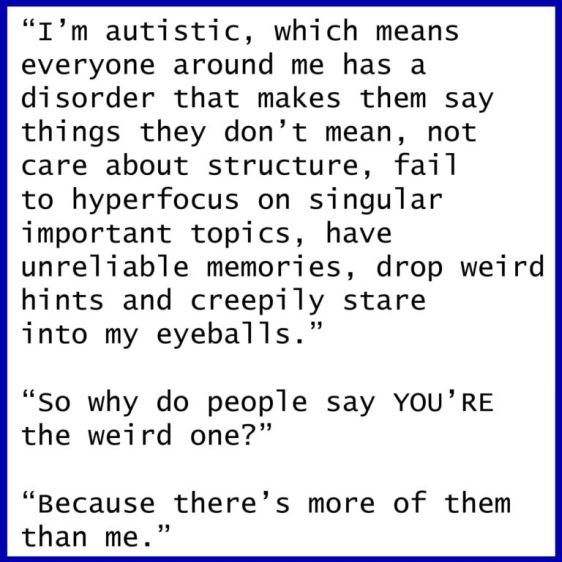
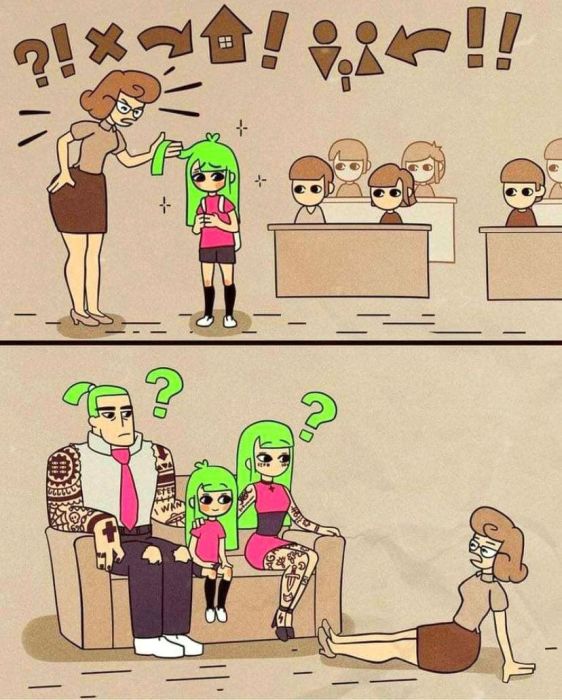
From Creating Autistic Suffering: Neuronormativity in mental health treatment:
"Psychological therapies start from the position that there is one correct way of experiencing the world, this in itself is neuronormativity. It assumes that the neurotypical experience is the standard that all should be trying to achieve. So when the Autistic patient enters the room, the therapist will first attempt to understand the Autistic person through the lens of neuronormative thinking, and then try to force the Autistic mind into a neurotypical box, and in turn apply their understanding of neurotypical mental health, onto a neurodivergent mind. This is a fundamental problem because Autistics simply do not think and experience the world in the same way as a neurotypical.
This medical neuroprovincialism creates gaslighting. Applying neuronormative standards to Autistic people regarding emotional and mental health creates further suffering by further traumatising us, creating more masking, and in turn lowering our ability to cope and manage our mental wellbeing. Thus, we have the vicious cycle of patient-blame perpetuating itself around the premise that Autistics have an incorrect experience of the world, and that cycle makes our mental health worse more often than it improves it.
In truth, nobody experiences the colour green in the same way, at least not that can be proven. Experience of emotion is entirely subjective, two people rarely even look the same, let alone having an identical experience of their inner worlds. Solipsism [the philosophical idea that only one's mind is sure to exist - your own existence is the only thing that is real or that can be known, and the self can be aware of nothing but its own experiences] tells us that we can not ever experience the world through another's eyes or mind, yet here are the neurotypical masses telling us what we should or shouldn't be feeling based on their own prejudiced standards of what they consider "normal". Labelling us disordered when we can not fit into that restrictive worldview. To add insult to injury, they're not even interested in asking us about our experience. They just push us through therapies..."
There are autistic and neurotypical people in the world, and the neurotypical majority has decided for their own convenience that autism is a disorder. This is as absurd as if the autistic minority had declared neurotypicality a disease. The topic is covered in an ironic article All About Neurotypicalism: A New Pathologised Condition, The Neurotypical Wife FB page and in the following pictures (ironic as well, of course):
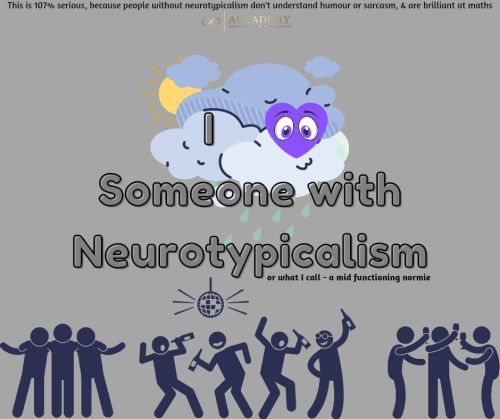
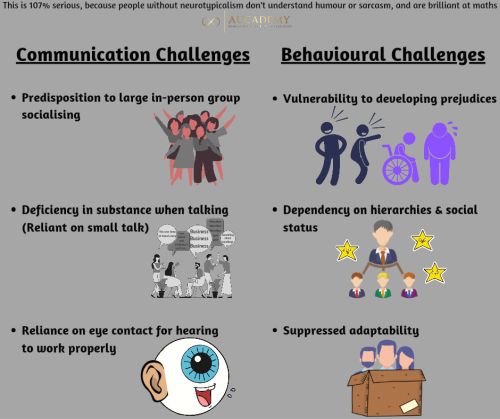
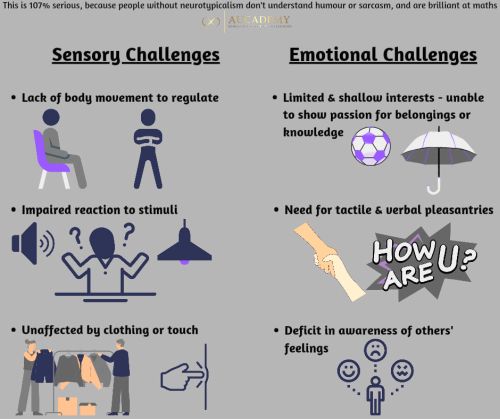
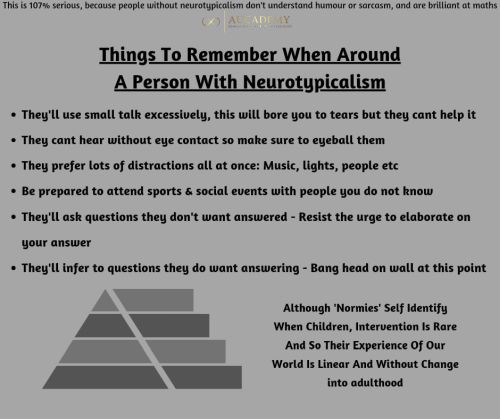
It is not easy... Introduction to ableism
I wrote above: quantitatively - not the norm, but qualitatively - not something bad. And yet, there is "something bad" in autism - it causes problems from childhood. Mainly because the world was created by neurotypicals for neurotypicals and is tailored to the majority which often refers to autistic people as strange, unsociable (although from the point of view of an autistic person that world itself can look strange, and sometimes unnecessarily intrusive). Even if the autistic people are not offended, many of them still feel that they are treated differently.
The neurotypical world acts on the principle "if I can do it, then you can too", although it is not so from the physiology's prospective. When an autistic person is treated like everyone else (sounds great, doesn't it? isn't that what all fighters for justice and equality strive for?), that can be a serious problem too. Autists have requirements that are not applicable to them in principle. I'm talking about study and work, where everything is designed for neurotypicals - it would be nice if the attitude of others took into account the specifics of autism, but who has heard of it? Even autistic people themselves often have no idea who they are, what can you expect from others? So it turns out that many teachers and bosses bully disabled people - not because these teachers and bosses are evil, but because they have not the slightest idea about what they are doing.
From Instagram:
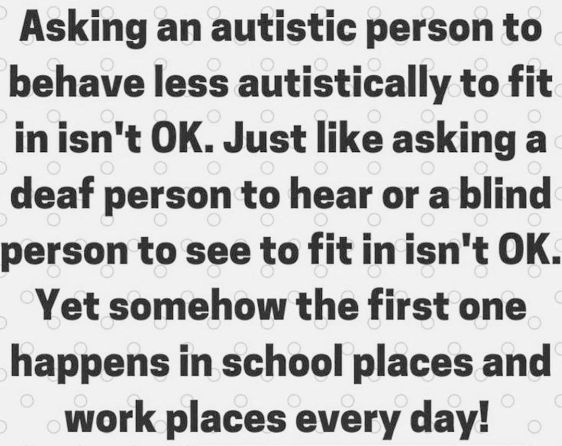
"I am absolutely exhausted from this. I am a teacher and there is a very specific way teachers are 'supposed' to act. It's absolutely soul crushing. Not to mention having to combat all the ableism that goes on when teachers are talking about what kids 'can't' do and what they're going to 'have to learn'. Autism is not a shell for allistic [non-autistic] people to crack open or a disorder to fix. It's a disability, yes. And some people need support to complete activities of daily living. Many aspects of autism are disabling because of intense ableism. Society abuses and traumatizes autistics every day by forcing us to deny ourselves."
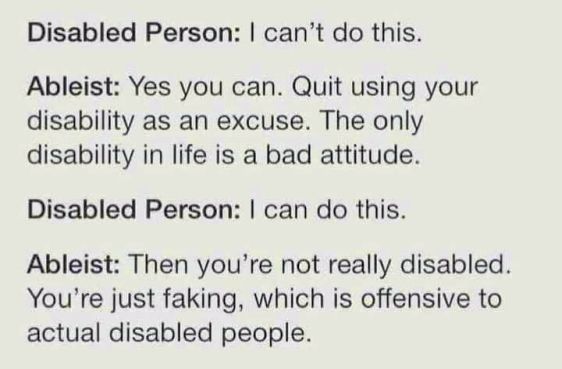
Judging by the laudatory annual performance reviews from my managers (as well as the fact that I have never been fired for poor performance in my two-decades career), I do just fine with my professional duties, but sometimes at the cost of invisible super-efforts, struggling and even suffering. This happens a lot when I do work that does not directly belong to my profession of a software developer - for example, investigate bugs of other programmers (especially if those guys weren't very good at the art of programming) or receive vague instructions directly from business users or analysts (instead of developing according to a clearly formulated detailed design specification). Often times, I go to work as if I'm going to war, and wage a real fight to meet performance expectations - my job drains me. At the end of the working day, I am often completely exhausted. Therefore, it is difficult for me to be on the side of those who argue that autism is not a disability. However, it must be said that it's not always difficult for me at work: if I have a well-articulated technical task (even if it is very complicated), I adore my job and time flies by!
From How I Came Out About My Disability:
"High functioning autism isn't an empty label just because it includes the words “high functioning.” It means I might have the ability to function under “neurotypical” demands — but only for a while. It means that not only do I need to rest frequently, but I also limit how I engage with people and I am mindful of where I am to reduce stress and overstimulation."
From Help autists who live near you! (in Russian):
"If you meet people who seem strange to you and not like most of your friends, remember that when communicating with you, they experience a much greater "culture shock" than people experience when looking at them, because they live in a world where their way of thinking and their natural way of behavior is not the norm, they live among people who in their mind are similar to aliens, whose behavior seems strange to them. It is quite possible that in the past they had to endure the bullying of these people. Before judging another person for strange behavior, imagine how you would feel if you had to pretend and behave in an unusual way all your life."
Imagine a society where all the people were deaf. It would probably be a very noisy world. Houses without noise insulation, cars without mufflers, fridge and other home appliances rumble like tractors, neighbors make repairs until midnight, people around are constantly making various sounds. And if some people suddenly, in a strange way, developed the ability to hear (due to a genetic mutation), then they would become disabled, because their experience would be incomprehensible to most people, and the environment would not be suitable (they would grow from birth in terrible conditions and will not be able to study normally at school, which is why they would be considered inferior, and doctors would advise to pierce their eardrums to make them normal). But this does not mean that hearing is a disease.
If you are a neurotypical person, then imagine yourself in a world in which everyone is autistic. Your sociability seems to others an alarming sign of your mental illness, the habit of looking into the eyes of your interlocutor is considered defiant behavior, the volume of your voice seems inadequate. You can neither understand what people want from you, nor convey your needs. When you create professional documents and conduct business correspondence, you are told that it is absolutely unacceptable to write so much, undefined and vague (nobody understands what you are trying to say), and that you should write briefly, precisely and concretely (but it's a huge problem for you!). It is hardly possible to maintain mental health in such an environment.
Now you understand that there is no contradiction between the fact that autism is not a disease and the fact that autistic people need support in the context of the existing society.
From A letter from the autistic colleague you didn't know you had:
"Not all disability is visible
I don't perceive the world the same as all other autistic people though - we really are all different. There's a range of characteristics of autism that we have to varying extents. For me, the main things are that I find being around people tiring, loud noises or background noise overwhelming and impossible to ignore, and a very deeply ingrained sense that I need to hide who and what I am. That last one is what comes from spending my whole life, until I was diagnosed three years ago, feeling that the ways I was different were my fault. I came to believe that if only I tried harder, if only I was less lazy, if only I was less selfish, I could be normal. But I can't. What can happen is that autistic people experience such trauma from others' reactions to their autism that they learn to hide it. That's what happened to me - but it's not any sort of "cure". It makes the situation worse, because the person learns that not to hide who they are is to be rejected and ostracised."
Psychological problems - bad mood, anxiety, depression - are more common among autistic people (they have a rate of depression nearly 4 times higher than the general population). For example, typical social anxiety includes fear of rejection or judgment in social situations. Autistic people may also be anxious about not having access to their special interests or about disruptions in routine. These problems can be caused both directly by autism (i.e., associated with physiological characteristics), and with the difficulties that autistic people experience living in a world that is not adapted for them, especially if they constantly put on the mask of a neurotypical in order to "be like everyone else", and also spend a lot of effort to continuously translate external signals of the world from neurotypical to autistic language. Most likely, these two sources of problems overlap.
In one article, I found a very correct definition: "Anxiety often takes on unusual forms in people with autism, turning any uncertainty into constant fear". Autistic people tend to have repetitive behaviors and obsessions with something. Now imagine that such a person is focused on negative thoughts! Of course, anybody can become anxious sometimes, but autists approach this "professionally", making disturbing thoughts their "special interest." This topic is well covered in the article What is anger rumination and how does it affect individuals with ASD.
I got rid of my general anxiety with zinc and caffeine removal, i.e. my problem was at the biological level. I do not know whether it is associated with autism - it may well be. BTW, getting rid of obstructive sleep apnea has also greatly contributed to the reduction of psychological problems. Note that there is a link between autism and obstructive sleep apnea.
Be sure to read the articles Autistic burnout, explained and ‘You don't look autistic’: The reality of high-functioning autism!

Autists are more likely to die prematurely. I think that the reasons are both in psychology ("software") ("all diseases are from the nerves") and in different physiology ("hardware"). Note that autistic people are much more likely to commit suicide:
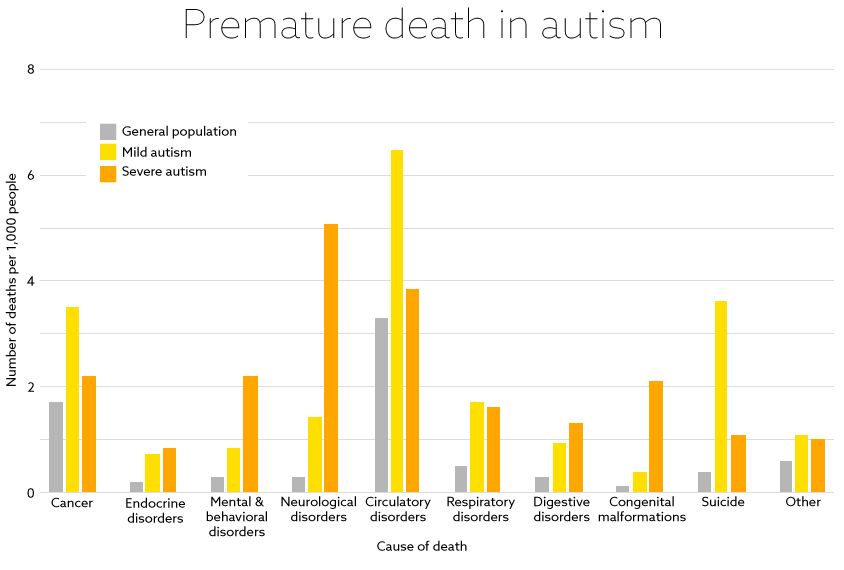
"The researchers found that people with autism died 16 years earlier at an average age of 54. Adults with the condition and learning disabilities died more than 30 years earlier than people without autism at an average age of 39.5 years. Adults with autism and without a learning disability died on average 12 years earlier, at 58." (The source)
Autism (Part 1) • Autism (Part 2) • Autism and job • ADHD • Monotropism • Questions for AI
